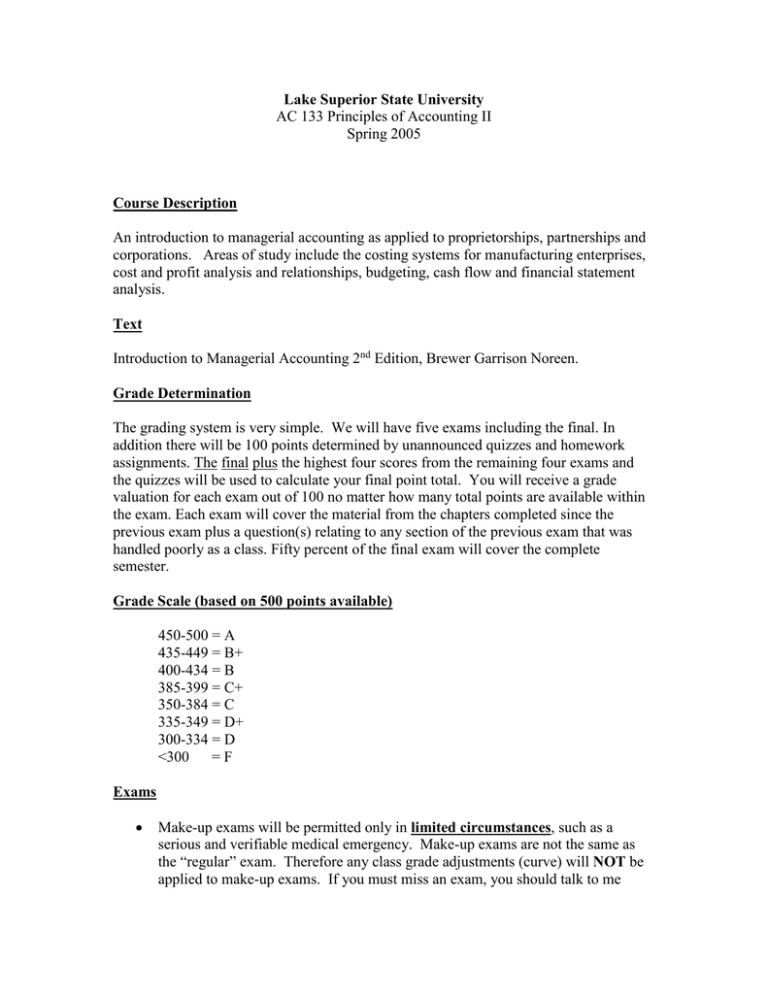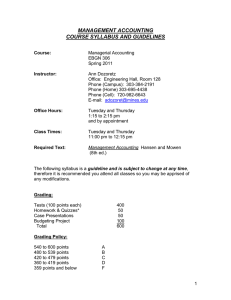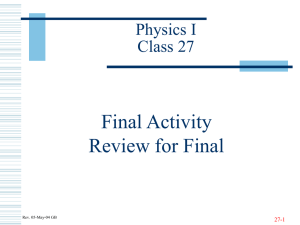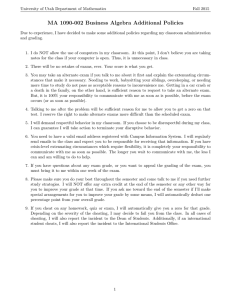Lake Superior State University Course Description AC 133 Principles of Accounting II
advertisement

Lake Superior State University AC 133 Principles of Accounting II Spring 2005 Course Description An introduction to managerial accounting as applied to proprietorships, partnerships and corporations. Areas of study include the costing systems for manufacturing enterprises, cost and profit analysis and relationships, budgeting, cash flow and financial statement analysis. Text Introduction to Managerial Accounting 2nd Edition, Brewer Garrison Noreen. Grade Determination The grading system is very simple. We will have five exams including the final. In addition there will be 100 points determined by unannounced quizzes and homework assignments. The final plus the highest four scores from the remaining four exams and the quizzes will be used to calculate your final point total. You will receive a grade valuation for each exam out of 100 no matter how many total points are available within the exam. Each exam will cover the material from the chapters completed since the previous exam plus a question(s) relating to any section of the previous exam that was handled poorly as a class. Fifty percent of the final exam will cover the complete semester. Grade Scale (based on 500 points available) 450-500 = A 435-449 = B+ 400-434 = B 385-399 = C+ 350-384 = C 335-349 = D+ 300-334 = D <300 =F Exams Make-up exams will be permitted only in limited circumstances, such as a serious and verifiable medical emergency. Make-up exams are not the same as the “regular” exam. Therefore any class grade adjustments (curve) will NOT be applied to make-up exams. If you must miss an exam, you should talk to me prior to the scheduled exam. I reserve the right to refuse any request for a makeup exam. Under university policy, excused absences due to university activities (such as athletic events) entitle students to take make-up exams. However, it is the responsibility of the student to provide written verification before any makeup exams will be given. There will be assigned seating for all exams. I utilize homework problems as a learning tool rather than a means of evaluation. It is however, most important that you use this tool to learn how to interpret data, structure a solution and perform appropriate calculations. When collected marks will be given for participation (see grade determination above). Only one make-up exam will be offered at the end of the term and it will be comprehensive including all material covered. There will be no mark-up opportunity for “in class quizzes”. Accommodation Statement In compliance with Lake Superior State University policy and equal access laws, disability-related accommodations or services are available. Students who desire such services are required to meet with the professor in a timely manner, preferably the first week of class, to discuss their disability-related needs. Students will not receive services until they register with the Resource Center for Students with Disabilities (RCSD). Proper registration will enable RCSD to verify the disability and determine reasonable academic accommodations. RCSD is located in RM 101 in the Library. The telephone number is 906-635-2454. Attendance Attendance is very important. In most instances performance in a subject bears a direct correlation to attendance. Therefore, you are expected to attend class regularly. If you must miss a class, it is your responsibility to find out what you missed. If you miss class and do not attempt to find out what was covered, you will fall behind. This course builds from class to class it is not a group of individual modules, miss one section and you will not understand the next. Since each class this semester is two hours missing one class will mean that a considerable amount of material will have been missed. In addition you may miss a quiz Important Dates Spring Semester 2005 Instruction Begins Tuesday January 11 Spring Break Friday February 25 Classes resume Monday March 7 Classes End Friday April 22 Semester Ends Friday April 29 Cheating I expect students to avoid both the act and the appearance of unethical conduct. Cheating in any form is totally unacceptable. The following is taken from page fifteen of the LSSU catalog for 2002-2004 “Cheating and Plagiarism: The assumption of the academic contract is that the student does his or her own work: any breach of the contract is considered cheating. The faculty member who detects a student cheating may take appropriate action, such as assigning a failing grade for the entire course. A student who cheats is subject to dismissal from the University. If in the opinion of the faculty member involved, such action is warranted, he or she will notify the chairman of the Scholastic Standards Committee and the student in writing. The Scholastic Standards Committee will then conduct a hearing in such a manner that the student is given due process. If the committee decides that dismissal is warranted, the student shall have five (5) school days to appeal that decision to the provost of the University. Suggestions Since penalties for cheating can be quite severe, avoid any act that could be interpreted as cheating. If you have any doubts, ask me!! Material to be learned The following is a tentative schedule of the material to be covered during the semester. Test dates will be announced in class. All reading and problem assignments will be announced in class. Chapter 1 2 3 4 5 6 7 Topic Introducing Management Accounting and Cost Concepts Job-Order Costing Activity-Based Costing Process Costing Exam 1,2,3,4 Cost Behavior Cost-Volume-Profit Profit Planning Exercises To Be Assigned “ “ “ “ “ “ 8 9 10 11 12 13 14 Exam 5,6,7 Standard Costs Flexible Budgets and Overhead Analysis Decentralization Exam 8,9,10 Relevant Costs for Decision Making Capital Budgeting Decisions Exam 11,12 Statement of Cash Flows Financial Statement Analysis Final Exam 50% 13,14/50% 1-12 “ “ “ “ “ “ “ Course Outcome Students will acquire knowledge of a practical core business subject and be functional in its application and how it is integrated into the general business environment. They will acquire some research and analysis skills to apply the accounting skills.






